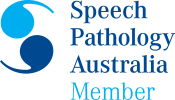There are a number or speech errors, also know as phonological processes, that normally developing children produce. These include substitutions of back sounds, which are harder to produce, e.g. K and G sounds, for front sounds, e.g. T and D sound, causing them to say a word like ‘cat’ as ‘tat’. Children may also voice a sound, which does not require voicing, e.g. the ‘k’ in ‘dock’ when voiced may sound like ‘dog’.
Another common error is deleting one sound within a cluster such as the ‘st’ cluster without the ‘s’ which would turn a word such as ‘star’ into ‘tar’. Alternatively, the child may delete a sound at the start or at the end of a word and instead produce a word like ‘cat’ as ‘ca’.
Processes such as these are normal around 3-4 years of age however if these errors are present after this age, sometimes the child’s representation of the sound has been distorted during this time and when they attempt to pair the sound with a letter, their poor awareness of this sound causes spelling errors.
Some common examples of these spelling errors may include;
- Substitution of sounds for the error sound they used to produce or deleting the sound entirely. This may cause a child to spell the word ‘cat’ or ‘tat’ and the word ‘dock’ may be spelt as ‘dog’.
- Deleting sounds within a word when sounding out to spell.
This may look like ‘star’ being spelled as ‘sar’ or ‘cat being spelt as ‘ca’ or ‘at’
Errors such as these require specific speech pathology intervention targeted at improving sound awareness. This type of intervention improves a child’s ability to detect the sounds within a word, and manipulate these sounds in their head without the use of letters. For this reason, we refer to these phonological awareness skills as pre-literacy skills.
Once your child has mastered the ability to detect and manipulate the sounds without the symbolic alphabet letters, these same skills are then applied with the letters to detect and manipulate written words. This in turn allows them to correctly spell words and detect spelling mistakes they have made in order to self-correct independently.
Contact us for results focused speech therapy
This article was written by our Speech Pathologist Ashleigh Fattah who is a Speech Pathology Australia member. If you have speech pathology related questions, make an appointment. We‘ll provide you with simple and effective therapy targeted to your concerns. Contact us today.
The post How speech delay can impact reading and spelling appeared first on ENT Wellbeing Sydney.










